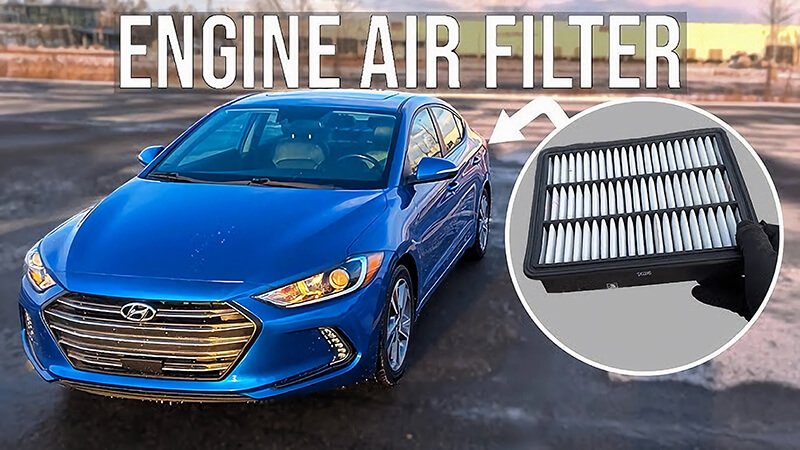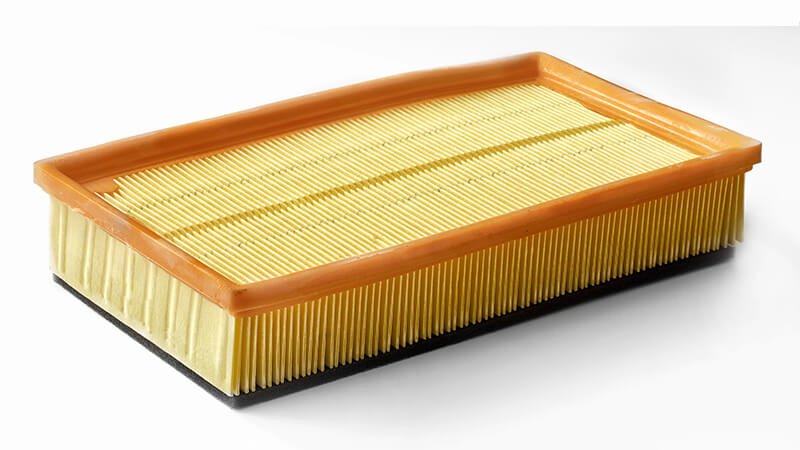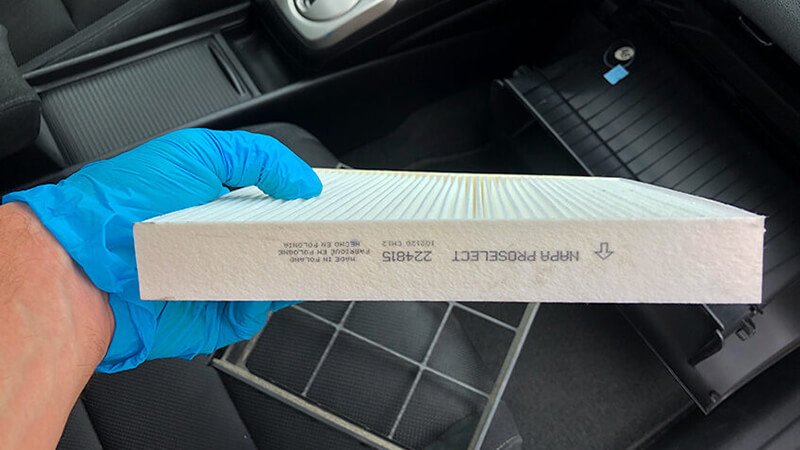Your engine air filter plays a crucial role in your vehicle’s performance, yet it often goes unnoticed until problems arise. A clogged or dirty air filter can drastically affect engine efficiency. So, do you really need to replace it regularly? Let’s find out.
Replacing the engine air filter is essential for maintaining engine performance. A clogged filter restricts airflow, which can lead to reduced fuel efficiency, poor acceleration, and even long-term engine damage. Regular replacement ensures optimal performance, better fuel economy, and fewer emissions.
The engine air filter is vital for smooth operation, but many vehicle owners underestimate its importance. Let’s explore whether you really need to replace it and what could happen if you don’t.

Is replacing an engine air filter necessary?
When it comes to regular vehicle maintenance, some tasks seem more critical than others. Replacing the engine air filter, however, is a non-negotiable step to keeping your engine running efficiently.
Replacing your engine air filter is necessary to ensure proper airflow to the engine. A clogged filter limits air intake, which affects the combustion process, leading to poorer engine performance, higher fuel consumption, and more harmful emissions.
The engine air filter1’s main function is to prevent dirt, debris, and other contaminants from entering the engine. When the filter becomes clogged or dirty, it can cause several issues that directly affect the engine's performance.
1. Reduced Engine Efficiency
The engine requires a specific amount of air to function optimally. A dirty air filter limits the volume of clean air entering the engine, leading to inefficient combustion. This results in reduced power, sluggish acceleration, and an overall decline in performance. By replacing the air filter regularly, you ensure that the engine receives enough airflow to work at peak efficiency.
| Issue | Effect on Engine |
|---|---|
| Clogged Air Filter | Reduced airflow, inefficient combustion |
| Properly Replaced Filter | Optimal airflow, efficient combustion |
2. Increased Fuel Consumption
A clogged engine air filter causes the engine to work harder to draw in the necessary air. This can increase fuel consumption2 as the engine tries to compensate for the reduced airflow. Replacing the air filter helps reduce the workload on the engine, improving fuel economy and saving you money at the pump.
| Condition | Fuel Efficiency Impact |
|---|---|
| Dirty Air Filter | Decreased fuel economy |
| Clean Air Filter | Improved fuel efficiency |
3. Prolonged Engine Life
Your engine’s longevity relies on maintaining its components, including the air filter. Over time, a dirty filter can cause dirt and debris to enter the engine, potentially leading to internal damage. Replacing the air filter regularly ensures that the engine stays clean and functions properly, extending its lifespan.
| Maintenance Frequency | Engine Life Impact |
|---|---|
| Regular Air Filter Changes | Prolonged engine life3 |
| Neglecting Filter Changes | Increased engine wear |
4. Reduced Emissions
A properly functioning engine air filter ensures that the combustion process is as clean as possible. When the filter is clogged, the engine burns fuel inefficiently, which can increase emissions. Regularly replacing the air filter helps reduce your vehicle’s carbon footprint and makes it more environmentally friendly.
| Condition | Emissions Impact |
|---|---|
| Clogged Air Filter | Increased emissions |
| Clean Air Filter | Reduced emissions |
In summary, replacing your engine air filter is crucial for maintaining fuel efficiency, engine performance, and reducing harmful emissions. It is a small investment that pays off by extending the lifespan of your engine and reducing long-term repair costs.

What happens if you never change your air filter?
You may wonder what would happen if you simply ignored your engine air filter. After all, it’s just a filter, right? Unfortunately, neglecting this small but vital part can cause serious damage over time.
If you never change your engine air filter, you risk reduced engine performance, increased fuel consumption, and even long-term engine damage. The filter’s role in maintaining clean airflow is crucial for optimal combustion and engine efficiency.
Neglecting to replace the engine air filter might seem like a minor oversight, but it can have far-reaching consequences. Here are the potential issues that could arise:
1. Poor Engine Performance4
If the air filter is not replaced, dirt and debris will clog it over time. This restricts the amount of clean air entering the engine, leading to poor performance, especially during acceleration. The engine may struggle to reach higher speeds, and you may notice a significant decrease in responsiveness.
| Condition | Engine Performance |
|---|---|
| Dirty Air Filter | Poor acceleration, sluggish performance |
| Clean Air Filter | Responsive, peak performance |
2. Increased Fuel Costs5
With a clogged air filter, the engine has to work harder to take in air, which can result in increased fuel consumption. A study on a fleet of vehicles revealed that replacing dirty air filters improved fuel efficiency by a noticeable margin. Ignoring this maintenance task could lead to rising fuel costs, which could significantly affect your budget over time.
| Condition | Fuel Economy |
|---|---|
| Dirty Air Filter | Increased fuel consumption |
| New Air Filter | Improved fuel efficiency |
3. Engine Damage
Over time, a blocked air filter can let dirt and contaminants enter the engine. These particles can damage critical components like the pistons and cylinders, causing wear and tear. In severe cases, it can lead to engine failure. Regular filter replacement can prevent these costly repairs.
| Condition | Engine Damage Risk |
|---|---|
| Dirty Air Filter | Increased wear, potential failure |
| Clean Air Filter | Reduced risk of damage |
4. Environmental Impact6
A dirty air filter leads to inefficient combustion, which increases the number of harmful emissions produced by your vehicle. If you skip regular maintenance, your car will produce more pollutants, contributing to air pollution. Replacing the air filter is a simple way to reduce your vehicle's carbon footprint.
| Condition | Emissions Impact |
|---|---|
| Dirty Air Filter | Increased emissions |
| Clean Air Filter | Reduced emissions |
For all these reasons, it’s clear that not changing the air filter regularly can lead to increased repair costs, worse fuel economy, and more harm to the environment. It’s a simple maintenance task that should not be ignored.

Can I clean my engine air filter instead of replacing it?
You might be wondering if cleaning the engine air filter could be a viable alternative to replacing it altogether. It sounds like a quick fix, but is it really as effective?
While some filters can be cleaned, most engine air filters are designed to be replaced. Cleaning them might restore airflow temporarily, but it won’t offer the same long-term benefits as replacing the filter with a new one.
When it comes to engine air filters7, cleaning is generally not as effective as replacement. Here’s why:
1. Reduced Efficiency After Cleaning
Most engine air filters are designed to trap dust and debris effectively. Over time, these particles accumulate, and cleaning the filter doesn’t fully restore its efficiency. Even if you clean it thoroughly, the filter might still be clogged with microscopic debris that impedes airflow.
| Condition | Efficiency Impact |
|---|---|
| Cleaned Filter | Temporary improvement |
| Replaced Filter | Long-term optimal efficiency |
2. Risk of Damage
Cleaning a filter improperly, such as using high-pressure air or harsh chemicals, can damage its delicate structure. This can lead to leaks, reduced filtration capacity, and even pieces of the filter breaking off and entering the engine, which could cause significant damage.
| Cleaning Method | Risk of Damage8 |
|---|---|
| Improper Cleaning | Increased risk of damage |
| Proper Replacement | No risk of damage |
3. Limited Lifespan
While cleaning may offer a temporary fix, it does not restore the filter’s full effectiveness. Air filters are designed for a specific lifespan, and after a certain point, they become less effective at filtering out harmful particles, even with cleaning. Replacing the filter guarantees optimal performance and protection for your engine.
| Cleaning vs. Replacement | Long-Term Impact |
|---|---|
| Cleaning Only | Reduced long-term effectiveness |
| Replacement | Optimal filtration over time |
In conclusion, while cleaning your engine air filter may be suitable in some cases, replacement is typically the best option for maintaining your vehicle’s performance and longevity.

How do I know if I need a new engine air filter?
It’s not always easy to tell when your engine air filter needs replacing. However, there are some clear signs that indicate it’s time for a new one.
If you notice decreased engine performance, increased fuel consumption, or strange engine sounds, it’s likely time to replace the air filter. Regular maintenance checks can also help you identify when the filter needs replacing.
Knowing when to replace your engine air filter is essential for maintaining vehicle performance. Here are the most common signs:
1. Poor Acceleration9
If you find that your vehicle accelerates sluggishly or struggles to reach higher speeds, it could be due to a clogged air filter. The engine requires proper airflow to perform well, and a blocked filter can hinder this.
| Acceleration Performance | Air Filter Condition |
|---|---|
| Sluggish, slow response | Clogged air filter |
| Smooth, fast acceleration | Clean air filter |
2. Decreased Fuel Efficiency10
A drop in fuel efficiency is another red flag. If you notice that you’re filling up more often than usual, it may be time for a new air filter. A clogged filter makes the engine work harder, which results in more fuel consumption.
| Fuel Economy | Air Filter Condition |
|---|---|
| Increased fuel consumption | Dirty air filter |
| Better fuel economy | Clean air filter |
3. Unusual Engine Sounds
A clogged air filter can cause your engine to make strange sounds, such as a whistling or sputtering noise. These sounds indicate that the engine is struggling due to insufficient airflow.
| Engine Sound | Air Filter Condition |
|---|---|
| Whistling, sputtering noise | Dirty air filter |
| Smooth engine sound | Clean air filter |
4. Check Engine Light
In some cases, a clogged air filter can trigger the check engine light. If this happens, it’s worth inspecting the air filter and replacing it if necessary.
| Check Engine Light11 Triggered | Air Filter Condition |
|---|---|
| Yes | Likely a clogged filter |
| No | Clean filter |
Replacing the engine air filter is a simple maintenance task that can prevent long-term engine issues. Keeping an eye on these signs can help ensure your vehicle performs optimally.

Conclusion
In conclusion, replacing your engine air filter12 is a simple but essential maintenance step for your vehicle. It ensures proper airflow, improves fuel efficiency, and protects your engine from damage. Ignoring it can lead to poor performance and higher costs. Regularly checking and replacing the air filter is a small investment that pays off in the long run.
-
Understanding the role of the engine air filter can help you maintain your vehicle's performance and longevity. ↩
-
Learn how a clean air filter can improve fuel efficiency and save you money at the pump. ↩
-
Discover the connection between air filter maintenance and engine longevity for better vehicle care. ↩
-
Understanding how a dirty air filter affects engine performance can help you maintain your vehicle better and avoid costly repairs. ↩
-
Learn how a clogged air filter can lead to increased fuel costs and how regular maintenance can save you money in the long run. ↩
-
Discover how maintaining your air filter can reduce emissions and contribute to a healthier environment. ↩
-
Explore this link to understand why replacing engine air filters is crucial for your vehicle's performance and longevity. ↩
-
Discover the potential dangers of improper cleaning methods for engine air filters and how to avoid them. ↩
-
Understanding the causes of poor acceleration can help you diagnose issues with your vehicle's air filter and overall performance. ↩
-
Exploring this topic will provide insights into how air filters impact fuel consumption and vehicle performance. ↩
-
This resource can clarify the relationship between the check engine light and air filter issues, aiding in timely vehicle maintenance. ↩
-
Knowing everything about air filter from Runex, clicking to get your best products for your business. ↩













